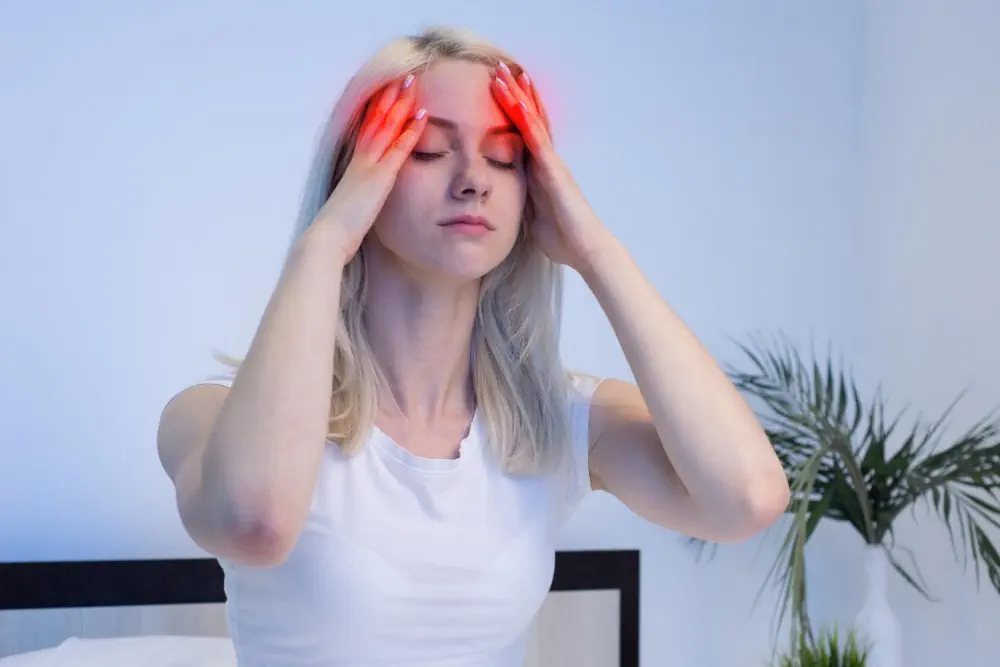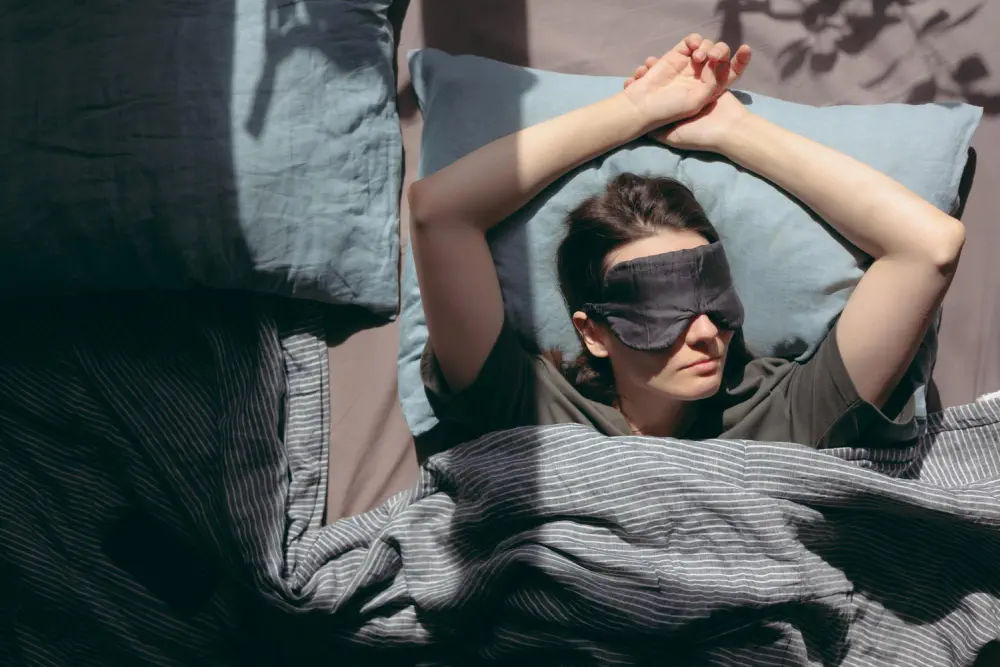We offer medical detox and multiple addiction treatment options in our
luxury treatment centres in Port Hope, Cobourg, and Ottawa.
Quviviq Side Effects and How to Handle Them
Sleep troubles can leave you feeling exhausted and frustrated, affecting every aspect of your daily routine. Quviviq (daridorexant) represents a newer approach to treating persistent insomnia, working differently than traditional sleep medications. While this medication can restore restful nights, potential reactions deserve serious attention before starting treatment.

Key Takeaways
- Side Effect Categories: Physical symptoms like headaches and drowsiness appear most commonly, while complex behaviours during sleep demand immediate medical attention and treatment stoppage.
- Timeline Expectations: Most Quviviq side effects emerge within the first few days, with many lessening as your body adapts over several weeks of consistent use.
- Management Strategies: Taking the medication at the right time, ensuring full nights of sleep, and eliminating alcohol consumption dramatically lowers your risk of experiencing adverse reactions.
- Professional Support: Regular check-ins with your doctor help catch concerning patterns early, while severe reactions like mood shifts or unconscious activities require urgent medical care.
- Addiction Considerations: Research demonstrates low physical dependence potential, though people with previous substance use need extra monitoring throughout treatment.
What is Quviviq and How Does It Affect Your Body?
Quviviq is a prescription sleep medication containing daridorexant, approved specifically for adults struggling with chronic insomnia lasting three months or longer. Unlike older sleep drugs that knock you unconscious, this medication blocks specific brain chemicals called orexins that signal your mind to stay alert and awake.
It affects your sleep cycle by attaching to orexin receptors in your brain, essentially turning down the volume on your body's natural wake-promoting signals. This allows your natural sleep mechanisms to take over more easily, helping you fall asleep faster and stay asleep through the night.
What Makes Quviviq Different from Other Sleep Medications
Traditional sleep aids work by flooding your brain with sedating chemicals, creating an artificial drowsiness that can leave you groggy the next morning. Quviviq for sleep takes a more targeted approach by addressing one of the root biological causes of sleeplessness.
Key differences include:
- Mechanism: Blocks wake signals rather than forcing sleep
- Duration: Shorter half-life means less next-day drowsiness
- Tolerance: Lower risk of needing higher doses over time
- Memory: Less impact on sleep architecture and dream cycles
Most Z-drugs like Ambien work within 15-30 minutes but can cause memory gaps and complex sleep behaviours. Benzodiazepines like Ativan create deeper sedation but carry higher addiction risks. Quviviq typically starts working within 30 minutes while maintaining more natural sleep patterns.
Who Takes Quviviq and Why Side Effects Matter
Doctors prescribe this medication for adults whose insomnia significantly disrupts their daily functioning and hasn't responded to behavioural treatments like sleep hygiene improvements or cognitive therapy. The medication works best for people who can commit to taking it consistently every night.
| Patient Profile | Common Characteristics | Side Effect Risks |
| Chronic Insomnia Sufferers | 3+ months of sleep difficulty, tried other treatments | Moderate — most adapt within weeks |
| Shift Workers | Irregular sleep schedules, work-related sleep issues | Higher — disrupted circadian rhythms |
| Older Adults (65+) | Age-related sleep changes, multiple medications | Elevated — increased fall risk, slower metabolism |
| Those in Recovery | Previous substance use, sleep disturbances during healing | Requires monitoring — history of dependence |
Side effects matter because they can undermine the very sleep improvement you're seeking. Next-day drowsiness defeats the purpose if you can't function at work or drive safely. For individuals in addiction recovery, understanding daridorexant side effects becomes even more crucial since any medication that affects brain chemistry deserves careful monitoring.
What are the Most Common Quviviq Side Effects?

Most people who start taking Quviviq experience some form of reaction during their first few weeks. The good news? Many of these effects fade as your body gets used to the medication. But knowing what to expect helps you prepare and decide if the benefits outweigh the drawbacks.
Physical Side Effects
Your body needs time to adjust to any new medication, and Quviviq side effects typically appear in predictable patterns. Some people sail through without any problems, while others deal with noticeable discomfort that gradually improves.
- Headaches: About 6% of people experience these, usually mild and temporary
- Next-day drowsiness: Ranges from slight grogginess to significant fatigue lasting hours
- Dizziness: Can happen when standing up quickly or moving around
- Nausea: Usually mild stomach upset, especially when starting treatment
- Dry mouth: Less common but bothersome for some people
- Muscle aches: Occasional soreness that typically resolves within days
Headaches tend to hit during the first week, then back off. The drowsiness issue proves trickier — some people feel foggy for hours after waking up, which obviously creates problems if you need to drive or concentrate at work.
Your age and overall health play a big role in how these effects hit you. Younger, healthier people often bounce back faster, while older adults might struggle with lingering fatigue that affects their daily routine.
Daytime Impairment and Safety Concerns
This medication can mess with your ability to function the next day, and that's not just inconvenient — it can be dangerous. The sleepy feeling doesn't always fade when your alarm goes off.
Driving becomes risky if you're still feeling the medication's effects. Clinical research published in PMC (PubMed Central) found that while average driving performance wasn't significantly impaired, some people taking the 50mg dose did show measurable driving impairment the morning after taking Quviviq. That split-second delay in hitting the brakes could mean the difference between a close call and an accident.
At work, you might find yourself struggling to focus on tasks that usually come easily. Making decisions feels harder. Your coordination might be slightly off, which matters if your job involves operating machinery or requires precise movements.
Older adults face additional risks because they process medications more slowly. Falls become a real concern when dizziness combines with unsteady legs. Even something as simple as walking to the bathroom at night becomes more hazardous.
Serious Quviviq Side Effects That Require Immediate Attention
While most people experience only mild reactions to Quviviq, some may face genuinely scary situations that need swift action. These aren't things you should tough out or wait to see if they get better on their own.
When Sleep Becomes Dangerous
Your brain gets stuck between sleep and waking, leaving you moving around without forming memories or making rational decisions. You might look awake to others, but you're not really conscious.
Complex sleep behaviours include:
- Sleepwalking: Getting up and moving around without awareness
- Sleep-driving: Actually getting behind the wheel and driving
- Sleep-eating: Preparing and consuming food with no memory
- Making phone calls: Having conversations you won't remember
- Sexual activity: Engaging intimately while not fully conscious
- Online activities: Shopping or sending messages unconsciously
Stop taking Quviviq immediately if any of these happen and call your doctor before your next dose.
Mental Health and Mood Changes

Sleep medications can disturb your emotional balance in ways that surprise both you and your family. Depression might suddenly feel overwhelming, or thoughts that never occurred to you before start seeming reasonable.
Daridorexant side effects affecting mental health include:
- Worsening depression: Feeling hopeless or like nothing will improve
- Suicidal thoughts: Having ideas about ending your life
- Sleep paralysis: Unable to move or speak while falling asleep or waking up
- Hallucinations: Seeing, hearing, or feeling things that aren't there
- Severe anxiety: Panic attacks or overwhelming worry
- Extreme mood swings: Going from fine to devastated without clear reasons
Your family might notice personality changes before you do. Any thoughts about suicide or self-harm require emergency medical attention — don't wait until morning.
Allergic Reactions and Rare But Serious Effects
Your body might reject Quviviq in ways ranging from annoying to life-threatening. True allergic reactions weren't seen in the original trials but have been reported since the medication became available.
Warning signs include:
- Skin reactions: Rash, hives, or severe itching spreading across your body
- Facial swelling: Puffiness around eyes, lips, tongue, or throat
- Breathing problems: Wheezing, shortness of breath, or airway closure
- Severe dizziness: Feeling faint or actually losing consciousness
- Muscle weakness: Legs suddenly not working properly during the day or night
Stop the medication immediately and get medical help if you notice any allergic reaction signs. Breathing difficulties are most dangerous — call 911 if your airway feels compromised.
Is Quviviq Addictive?
Research shows minimal addiction potential, though the full picture needs explanation. Quviviq carries a Schedule IV controlled substance classification — the same category as Xanax and Ambien. This rating exists as a precaution for any medication affecting brain chemistry, not because addiction commonly occurs.
Clinical trials lasting up to 12 months found no physical dependence in participants, according to research published in The Lancet Neurology by Mignot et al. (2022). People stopping the medication didn't experience withdrawal symptoms like shaking, sweating, or intense cravings. Most importantly, stopping Quviviq didn't trigger rebound insomnia.
Traditional sleep aids flood your system with artificial calm, creating a chemical high your brain starts craving. Quviviq for sleep works differently by turning down natural wake signals. There's no euphoric feeling to chase. However, psychological dependence remains possible. The fear of returning to sleepless nights can create anxiety about stopping the medication, even without physical addiction.
Special Considerations for People in Recovery
Individuals with addiction histories face unique challenges when considering any controlled substance, even one with low dependency potential. Past substance use changes how your brain responds to medications, potentially increasing sensitivity to any mood-altering effects.
Recovery programs often emphasize avoiding all controlled substances when possible. This creates a difficult balance — managing legitimate medical needs while protecting hard-won sobriety. Some people in recovery worry that taking any sleep medication represents a step backward in their healing journey.
We at the Canadian Centre for Addictions approach this situation carefully. We recognize that untreated insomnia can actually threaten recovery by increasing stress, lowering emotional regulation, and making healthy coping strategies harder to maintain. Poor sleep often drives people toward old patterns of substance use as they desperately seek relief.
Our approach includes:
- Individual assessment: Evaluating length of sobriety, specific addiction history, current support systems, and severity of sleep problems
- Medication as a last resort: Recommending behavioural approaches first, with Quviviq only when other methods fail
- Close monitoring: Scheduling frequent check-ins to assess effectiveness and watch for concerning usage patterns
- Family involvement: Including loved ones in discussions to provide perspective on behavioural changes
- Multi-tool approach: Teaching cognitive behavioural therapy techniques, sleep hygiene improvements, and stress management skills
- Social support: Helping patients navigate peer pressure from recovery groups that view any controlled substance as unacceptable
The goal remains building sustainable sleep habits that reduce long-term reliance on any medication while respecting individual medical needs over group pressure.
How Can You Effectively Minimize Quviviq Side Effects?

Smart strategies can dramatically reduce your chances of experiencing Quviviq side effects. Most problems stem from timing mistakes, lifestyle conflicts, or poor communication with your doctor. Small adjustments often make the difference between struggling with reactions and sleeping peacefully.
1. Proper Usage and Timing Strategies
Getting the timing right prevents most next-day drowsiness and coordination problems:
- Take exactly 30 minutes before bed: Not earlier, not later, to sync with your natural sleep window
- Guarantee 7+ hours of sleep: Less time in bed almost guarantees morning grogginess
- Avoid late dinners: Food delays absorption by about an hour, extending drowsy periods
- Skip alcohol completely: Even one drink magnifies sedating effects and increases fall risk
- Don't double up: Never take an extra dose if you wake up during the night
- Stay consistent: Same time every night helps your body adjust and reduces side effects
2. Lifestyle Modifications That Help
Your daily habits either support or sabotage the medication's effectiveness:
- Create a wind-down routine: Dim lights and quiet activities 30 minutes before taking Quviviq
- Keep your bedroom cool: Heat interferes with natural sleep cycles and medication absorption
- Limit afternoon caffeine: Coffee after 2 PM can fight against the medication's effects
- Exercise earlier in the day: Physical activity too close to bedtime can increase alertness
- Manage stress actively: High cortisol levels make sleep medications less effective
- Stay hydrated during the day: Dehydration worsens headaches and dizziness
3. Working with Your Healthcare Provider
Regular communication catches problems early and optimizes your treatment:
- Track your sleep patterns: Note how long it takes to fall asleep and any middle-of-night awakenings
- Record side effects timing: When they start, how long they last, and what makes them better or worse
- Report mood changes immediately: Don't wait for your next scheduled appointment
- Discuss other medications: Even over-the-counter drugs can interact with Quviviq
- Ask about dose adjustments: Starting lower might reduce side effects while still helping sleep
- Schedule regular check-ins: Monthly visits during the first few months help fine-tune treatment
Your doctor might suggest blood tests to check how your body processes the medication, especially if you're older or have liver problems. Some people need different doses based on their metabolism or other health conditions.
When to Seek Professional Help

Some reactions to Quviviq cross the line from bothersome to dangerous. Your safety matters more than getting good sleep, and as we discussed earlier, certain symptoms demand swift action:
- Complex sleep behaviours
- Breathing difficulties
- Suicidal thoughts
- Severe mood changes
- Allergic reactions
- Memory gaps
- Persistent severe drowsiness
- Falls or injuries
If you experience any of these warning signs, call 911 immediately. Don't try to drive yourself to the hospital or wait to see if symptoms improve on their own.
Taking the Next Step Toward Better Sleep Health
Sleep problems often reflect deeper issues that medication alone can't fix. Chronic insomnia might stem from unresolved trauma, anxiety disorders, depression, or other mental health challenges that need specialized attention.
At the Canadian Centre for Addictions, we understand that sleep disturbances frequently connect to addiction recovery, mental health struggles, and overall wellness. Our team provides thorough assessment and treatment for the underlying conditions affecting your sleep quality and daily life.
Recovery means more than just managing symptoms — it means building sustainable habits and addressing root causes. Whether you're concerned about developing dependency on sleep medications or need support managing conditions that disrupt your rest, we're here to help.
Ready to explore comprehensive sleep health solutions? Contact the Canadian Centre for Addictions at 1-855-499-9446. Our experienced team can evaluate your situation and create a personalized treatment plan that addresses both your sleep concerns and overall wellness needs.
FAQ
How long do Quviviq side effects typically last?
Most Quviviq side effects fade within 2-3 weeks as your body adjusts to the medication. Headaches and mild drowsiness usually improve first, while sleep timing adjustments may take a month.
Can I drive the day after taking Quviviq?
Only if you slept for at least 7 hours and feel completely alert. Clinical research shows some people have impaired driving ability the morning after, so test your alertness before getting behind the wheel.
What should I do if I experience sleepwalking or other complex sleep behaviours?
Stop taking Quviviq immediately and call your doctor before taking another dose. These behaviours indicate the medication isn't safe for you and won't improve with continued use.
Is it safe to take Quviviq long-term?
Studies show Quviviq remains safe and effective for at least 12 months of nightly use. Your doctor should evaluate your need for continued treatment every few months.
How do I know if my side effects are serious enough to stop the medication?
Contact your doctor if side effects interfere with daily activities or don't improve after 2-3 weeks. Stop immediately and seek emergency care for breathing problems, suicidal thoughts, or complex sleep behaviours.
Can Quviviq interfere with addiction recovery?
Quviviq has low addiction potential, but people in recovery need closer monitoring. Poor sleep can actually threaten sobriety, so the benefits often outweigh the risks when used under proper medical supervision.






